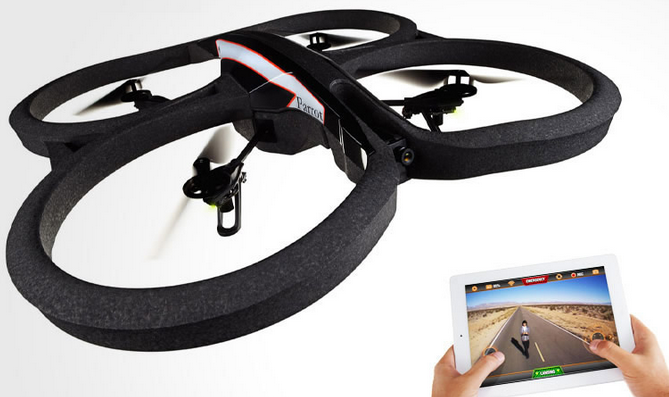Domestic drones and their unique dangers
March 31, 2013

AR Drone 2.0 (credit: Parrot)
The use of drones by domestic U.S. law enforcement agencies is growing rapidly, both in terms of numbers and types of usage, blogger Glenn Greenwald writes in The Guardian.
A short summary of Greenwald’s comprehensive article:
- The belief that weaponized drones won’t be used on U.S. soil is patently irrational. Police departments are already speaking openly about how their drones “could be equipped to carry nonlethal weapons such as Tasers or a bean-bag gun.” The drone industry has already developed and is now aggressively marketing precisely such weaponized drones for domestic law enforcement use.
- Domestic weaponized drones will be much smaller and cheaper than military drones, as well as more agile — but just as lethal.
- The nation’s leading manufacturer of small “unmanned aircraft systems” (UAS), used both for surveillance and attack purposes, is AeroVironment, Inc. (AV). Its annual report stated: “Initial likely non-military users of small UAS include public safety organizations such as law enforcement agencies. . . .”
- The tiny “Switchblade” drone was hailed in an article as “the ultimate assassin bug“. Controlled by an iPad held by the operator, it can kill the target by exploding in his face.”
- The proliferation of domestic surveillance drones have already arrived. As the ACLU put it in their recent report: “U.S. law enforcement is greatly expanding its use of domestic drones for surveillance.” An LA Times article from last month reported that “federal authorities have stepped up efforts to license surveillance drones for law enforcement and other uses in US airspace” and that “the Federal Aviation Administration said Friday it had issued 1,428 permits to domestic drone operators since 2007, far more than were previously known.” Moreover, the agency “has estimated 10,000 drones could be aloft five years later” and “local and state law enforcement agencies are expected to be among the largest customers.”
- The prospect of cheap, small, portable flying video surveillance machines threatens to eradicate existing practical limits on aerial monitoring and allow for pervasive surveillance, police fishing expeditions, and abusive use of these tools in a way that could eventually eliminate the privacy Americans have traditionally enjoyed in their movements and activities, according to the ACLU report.
- As the ACLU explains in its domestic drone report: “routine aerial surveillance would profoundly change the character of public life in America” because only drone technology enables such omnipresent physical surveillance. Beyond that, the tiny size of surveillance drones enables them to reach places that helicopters obviously cannot, and to do so without detection. They can remain in the sky, hovering over a single place, for up to 20 hours, a duration that is always increasing — obviously far more than manned helicopters can achieve.
- Surveillance drones enable a pervasive, stealth and constantly hovering Surveillance State that is now well beyond the technological and financial abilities of law enforcement agencies.
- One significant reason why this proliferation of domestic drones has become so likely is the emergence of a powerful drone lobby, funneling a. massive amounts of money from the drone industry into the coffers of key Congressional members from both parties in this “drone caucus”.
- Drones enable more warfare, more aggression, and more surveillance. Drones make war more likely precisely because they entail so little risk to the war-making country. Similarly, while the propensity of drones to kill innocent people receives the bulk of media attention, the way in which drones psychologically terrorize the population — simply by constantly hovering over them: unseen but heard — is usually ignored, because it’s not happening in the U.S., so few people care. It remains to be seen how Americans will react to drones constantly hovering over their homes and their childrens’ schools, though by that point, their presence will be so institutionalized that it will be likely be too late to stop.
- Libertarian-minded GOP state legislators have been as responsive as more left-wing Democratic ones in working to impose some limits. One bill now pending in Congress would prohibit the use of surveillance drones on U.S. soil in the absence of a specific search warrant, and has bipartisan support.